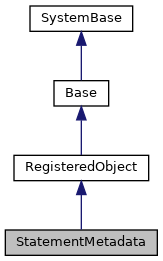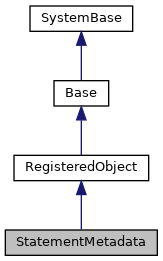

Public Member Functions | |
| _.Library.Status | OnNew (_.Library.Integer pStatementType, _.Library.Binary pMetadata, _.Library.Binary pParameters, _.Library.Binary pObjects, _.Library.Binary pArguments, _.Library.List pActualBinding, _.Library.List pDynamic) |
| This callback method is invoked by the <METHOD>New</METHOD> method to. More... | |
 Public Member Functions inherited from RegisteredObject Public Member Functions inherited from RegisteredObject | |
| _.Library.Status | OnAddToSaveSet (_.Library.Integer depth, _.Library.Integer insert, _.Library.Integer callcount) |
| This callback method is invoked when the current object is added to the SaveSet,. More... | |
| _.Library.Status | OnClose () |
| This callback method is invoked by the <METHOD>Close</METHOD> method to. More... | |
| _.Library.Status | OnConstructClone (_.Library.RegisteredObject object, _.Library.Boolean deep, _.Library.String cloned) |
| This callback method is invoked by the <METHOD>ConstructClone</METHOD> method to. More... | |
| _.Library.Status | OnNew () |
| This callback method is invoked by the <METHOD>New</METHOD> method to. More... | |
| _.Library.Status | OnValidateObject () |
| This callback method is invoked by the <METHOD>ValidateObject</METHOD> method to. More... | |
Public Attributes | |
| columnCount | |
| The number of columns defined as SQLRESULTCOL that are returned by executing this statement. More... | |
| columnIndex | |
| Index on column names and column number. More... | |
| columns | |
| columns is a collection of StatementColumn objects. More... | |
| formalParameters | |
| formalParameters is a collection of '?' parameters found in the prepared statement. More... | |
| interface | |
| interface is an integer value indicating the routine interface: More... | |
| objects | |
| A collection of StatementObject objects representing the columns that are object values. More... | |
| parameterCount | |
| The number of parameters defined in this statement. More... | |
| parameters | |
| The parameters collection contains the metadata for each actual parameter. More... | |
| statementType | |
Private Member Functions | |
| _.Library.Status | Display () |
| Display metadata on the current device. | |
Static Private Member Functions | |
| _.Library.Status | GenerateMetadata (_.Library.Binary pInfo, _.Library.Integer pStatementType, _.Library.Binary pMetadata, _.Library.Binary pParameters, _.Library.Binary pObjects, _.Library.List pActual, _.Library.List pDynamic) |
| GenerateMetadata constructs the serialized metadata from the query processor's info array. More... | |
Additional Inherited Members | |
 Static Public Attributes inherited from RegisteredObject Static Public Attributes inherited from RegisteredObject | |
| CAPTION = None | |
| Optional name used by the Form Wizard for a class when generating forms. More... | |
| JAVATYPE = None | |
| The Java type to be used when exported. | |
| PROPERTYVALIDATION = None | |
| This parameter controls the default validation behavior for the object. More... | |
For details on using this class, see SQL Metadata.
Metadata describes the statement interface. The statement metadata contains the type of statement, the number of columns defined by the statement and the metadata for each column. Statement columns are of three primary types: result columns, parameters, and the return value. There is also a distinction between the metadata available for a prepared statement and for a statement that has been executed since not all statement results are known at prepare time. For all statement types except CALL, the statement metadata is all available at prepare time. CALL statement metadata that is available at prepare time includes the metadata from the statement itself and that metadata is not to be confused with the metadata defined by the SQL routine that is called. Each routine defines a formal interface that consists of an optional return value and option input, input-output and output parameters. An SQL routine might also return a single preplanned result set. That metadata is available at prepare time and it consists of some number of columns of type SQLRESULTCOL. An SQL routine might also declare that it returns some dynamic result sets, the metadata for which is not available until after the statement is executed and the result sets bound dynamic cursors.
|
staticprivate |
GenerateMetadata constructs the serialized metadata from the query processor's info array.
IF %protocol 41 and higher:
metadata = $lb()
1 - # of SELECT columns
2 - i: <For each SELECT column>
1) Name
2) ODBC Type
3) Precision
4) Scale
5) NULLABLE (integer)
6) Column Label (same as Name)
7) Column Table Name
8) Column Schema Name
9) Column Qualifier Name - NULL
10) $Char(1)/$Char(0) string / $Extract position:
1) isAutoIncrement
2) isCaseSensitive
3) isCurrency
4) IsReadOnly
5) IsRowVersion
6) IsUnique
7) IsAliased
8) IsExpression
9) IsHidden
10) IsIdentity
11) IsKeyColumn
12) IsRowid
13) IsList
j - # of Parameters
j+1 - k: <For each Parameter>
1) ODBC Type
2) Precision
3) Scale
4) NULLABLE
5) colName
6) colType
IF %protocol less than 41:
metadata = $lb()
1 - # of SELECT columns
2 - i: <For each SELECT column>
1) Name
2) ODBC Type
3) Precision
4) Scale
5) NULLABLE
6) Column Label (same as Name)
7) Column Table Name
8) Column Schema Name
9) Column Qualifier Name - NULL
j - # of Parameters
j+1 - k: <For each Parameter>
1) ODBC Type
2) Precision
3) Scale
4) NULLABLE
| _.Library.Status OnNew | ( | _.Library.Integer | pStatementType, |
| _.Library.Binary | pMetadata, | ||
| _.Library.Binary | pParameters, | ||
| _.Library.Binary | pObjects, | ||
| _.Library.Binary | pArguments, | ||
| _.Library.List | pActualBinding, | ||
| _.Library.List | pDynamic | ||
| ) |
This callback method is invoked by the <METHOD>New</METHOD> method to.
provide notification that a new instance of an object is being created.
If this method returns an error then the object will not be created.
It is passed the arguments provided in the New call. When customizing this method, override the arguments with whatever variables and types you expect to receive from New(). For example, if you're going to call New, passing 2 arguments, OnNew's signature could be:
Method OnNew(dob as Date = "", name as Name = "") as Status
SQL.StatementMetadata is a metadata class for dynamic statement metadata. The initial value is the metadata from a StatementCache object. or it is the result set object itself.
pMetadata describes only the ROWTYPE metadata for a result set. Additional metadata is contained in pParameters and pObjects. The non-ROWTYPE metadata is a single node for non-result columns (in pParameters) and a single node for object metadata (in pObjects).
| columnCount |
The number of columns defined as SQLRESULTCOL that are returned by executing this statement.
This is the same as columns.Count().
| columnIndex |
Index on column names and column number.
| columns |
columns is a collection of StatementColumn objects.
Each StatementColumn object
contains the metadata a column defined by the statement as an SQLRESULTCOL column type.
| formalParameters |
formalParameters is a collection of '?' parameters found in the prepared statement.
It may differ from the parameters collection if literal replacement occurred. This property is mainly for internal use and metadata reporting. It is not meant to be used for the statement descriptor.
| interface |
interface is an integer value indicating the routine interface:
-2 - Return value, dynamic cursors returned (zero, one or more) -1 - No return value, dynamic cursors returned (RETURNRESULTSETS, zero one or more) 0 - No return value, no dynamic cursors (NOT RETURNRESULTSETS, aka "function" procedure although a function should return a value (interface = 2)) 1 - No return value, one pre-planned result set (AKA "query" procedure) 2 - Return value, no dynamic cursors (NOT RETURNRESULTSETS)
| objects |
A collection of StatementObject objects representing the columns that are object values.
| parameterCount |
The number of parameters defined in this statement.
This is the same as
parameters.Count().
| parameters |
The parameters collection contains the metadata for each actual parameter.
contained in the source statement. ..parameters.Count() is equivalent to the number of '?' parameters found in the source statement and the list position corresponds to the ordinal position of the '?' in the source statement.
| statementType |
Integer value indicating the type of statement.
| 1 | SELECT |
| 2 | INSERT (also 'INSERT OR UPDATE') |
| 3 | UPDATE |
| 4 | DELETE |
| 5 | COMMIT |
| 6 | ROLLBACK |
| 7 | GRANT |
| 8 | REVOKE |
| 9 | CREATE TABLE |
| 10 | ALTER TABLE |
| 11 | DROP TABLE |
| 12 | CREATE VIEW |
| 13 | ALTER VIEW |
| 14 | DROP VIEW |
| 15 | CREATE INDEX |
| 16 | ALTER INDEX (Not supported) |
| 17 | DROP INDEX |
| 18 | CREATE ROLE |
| 19 | DROP ROLE |
| 20 | SET TRANSACTION |
| 21 | START TRANSACTION |
| 22 | INTRANSACTION |
| 23 | BEGTRANS (Alias for START TRANSACTION) |
| 24 | INTRANS (Alias for INTRANSACTION) |
| 25 | GET (Not supported) |
| 26 | SET OPTION |
| 27 | STATISTICS (UPDATE STATISTICS, not supported)) |
| 28 | CHECKPRIV |
| 29 | CREATE USER |
| 30 | ALTER USER |
| 31 | DROP USER |
| 32 | CHECKPRIV (SQL Admin Privilege) |
| 33 | GRANT (SQL Admin Privilege) |
| 34 | REVOKE (SQL Admin Privilege) |
| 35 | CREATE FUNCTION |
| 36 | CREATE METHOD |
| 37 | CREATE PROCEDURE |
| 38 | CREATE QUERY |
| 39 | DROP FUNCTION |
| 40 | DROP METHOD |
| 41 | DROP PROCEDURE |
| 42 | DROP QUERY |
| 43 | CREATE TRIGGER |
| 44 | DROP TRIGGER |
| 45 | CALL |
| 46 | SAVEPOINT |
| 47 | LOCK TABLE |
| 48 | UNLOCK TABLE |
| 49 | CREATE DATABASE |
| 50 | DROP DATABASE |
| 51 | USE DATABASE |
| 52 | TUNE TABLE |
| 53 | DECLARE |
| 54 | CREATE MODEL |
| 55 | DROP MODEL |
| 56 | TRAIN MODEL |
| 57 | ALTER MODEL |
| 58 | VALIDATE MODEL |
| 59 | SET ML CONFIGURATION |
| 60 | CREATE ML CONFIGURATION |
| 61 | ALTER ML CONFIGURATION |
| 62 | DROP ML CONFIGURATION |
| 63 | FREEZE PLANS |
| 64 | UNFREEZE PLANS |
| 65 | PURGE |
| 66 | BUILD INDEX |
| 67 | CREATE AGGREGATE |
| 68 | DROP AGGREGATE |
| 69 | LOAD |
| 70 | CREATE SCHEMA |
| 71 | DROP SCHEMA |
| 72 | CREATE SERVER |
| 73 | ALTER SERVER |
| 74 | DROP SERVER |
| 75 | CREATE FOREIGN TABLE |
| 76 | ALTER FOREIGN TABLE |
| 77 | DROP FOREIGN TABLE |
| 78 | CANCEL QUERY |
| 79 | EXPLAIN |
| 99 | Anything not list above |